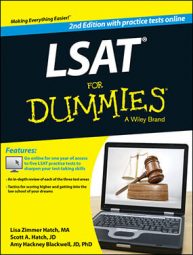On the LSAT, you will have to answer reading comprehension questions. These questions test how well you read. So don’t get thrown if you have no previous knowledge of the content. THe answer is always somewhere in the passage.
Reading comprehension sample questions
Black Apollo, by Kenneth Manning, describes the life of Ernest Everett Just, one of the first black scientists in America. Manning recounts Just's impoverished origins in South Carolina, his adaptations to a white educational system, and his professional careers as a zoology professor at Howard University and as an embryologist at Marine Biological Laboratory.
Despite countless difficulties imposed upon him by a world in which a black person was not supposed to practice science, Just became an internationally esteemed biologist. His story is one of courage, determination, and dedication to science. But Manning's goals are more far-reaching than to simply tell a story or describe one man's life.
After all, though Just was a brilliant biologist, he was not ultimately pivotal to the development of either science or race relations in the 20th century. The issues brought out in his story, however, are pivotal. A comprehensive appreciation of the conditions that Just faced in his daily work offers a powerful lens through which to examine the development of science and racial boundaries in America.
Manning wrote Just's story as a biography. In some respects, biography does not seem to be a promising medium for great historical work. Biographies simply tell a story. Most students receive their introductions to the history of science in the worshipful biographies of past scientific giants. Benjamin Franklin and Albert Einstein offer excellent examples to young students of how scientists contribute to society.
Biographies are popular for children's reading lists (and bestseller lists) because they have simple subjects, can present clear moral statements, and manage to teach a little history at the same time. This simplicity of form, however, does not preclude the biography from being a powerful medium for historical work and social commentary.
The biography yields particular rewards for the historian of science. One of the central principles of the history of science, indeed a central reason for the discipline, is to show that science is a product of social forces. This principle implies that historians and sociologists have insights on the practice of science that scientists, to whom the subject would otherwise fall, are less likely to produce.
Moreover, if society does influence science, then it behooves historians to explain how such an important process works.
The human orientation of the biography makes it an excellent medium in which historians can do this work. Were a researcher to investigate the development of scientific theory solely by reading the accounts written of a laboratory's experiments — by looking only at the “science” — the researcher would likely see a science moved by apparently rational forces toward a discernible goal.
But this picture is incomplete and artificial. If that researcher examines science through the people who generated it, a richer mosaic of actors emerges. The science biography has the potential to reveal both the person through the science and the science through the person.
From these perspectives, the forces of politics, emotions, and economics, each of which can direct science as much as rational thought, are more easily brought to light. Black Apollo is a riveting example of what a historian can accomplish with a skillful and directed use of biography.
Which one of the following most accurately states the main point of the passage?
(A) Ernest Everett Just was an extremely important biologist during the 20th century, both because of his contributions to the field of embryology and because of his race.
(B) Scientists tend to ignore the social, historical, and political forces that surround all scientific research and discovery, which makes their interpretations of scientific events incomplete.
(C) Biographies are a popular genre for children's books because they can tell discrete stories in an accessible fashion, incorporating scientific knowledge into a person's life and thereby making it more interesting to readers.
(D) Manning's work exemplifies how biography can be a powerful tool for a historian of science, who can use the genre to explore the effects of politics, economics, and emotions on the direction of scientific development.
(E) Kenneth Manning wrote Black Apollo to criticize racial prejudices and to prove that Ernest Everett Just could have been much more successful if he had not been the victim of discrimination.
According to the passage, the main goal of the discipline called history of science is to
(A) illuminate the effects of social forces on scientists in a way that scientists themselves are unlikely to do
(B) explain scientific discoveries in a manner that is easily understood by non-scientists
(C) write biographies of important scientific figures that portray their work against a social and political background
(D) influence scientific research by identifying the most important scientific contributions in history
(E) provide an academic discipline that allows people without science training to study scientific concepts
What is the primary purpose of the second paragraph?
(A) to describe the many things Ernest Everett Just accomplished despite the racial prejudice he faced
(B) to suggest that biography is really too simple a historical form for the historian of science to use to convey complex ideas
(C) to explain why biography is both a popular historical genre and a powerful medium for explaining the significance of scientific discoveries
(D) to argue against using biographies to teach children about scientific figures from the past
(E) to advocate increased teaching of the sciences in schools and universities
Answers
D
A
C

